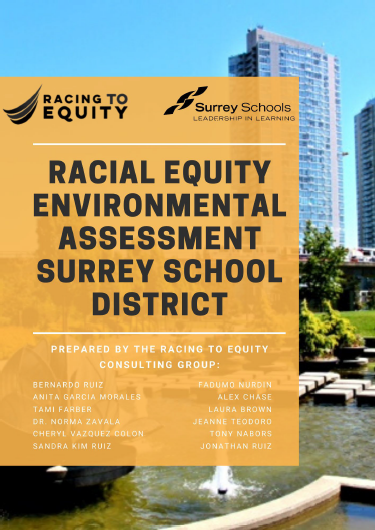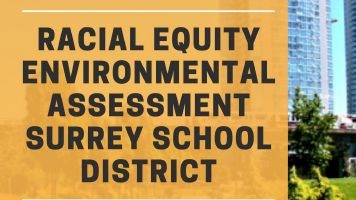Surrey Schools undergoes environmental assessment on racial equity
In Spring of 2021, Surrey Schools held 39 listening circles across the district for school communities to gather and share their experiences with racism. Participants included students, families, district office staff, educators, members of our school community and the broader Surrey and White Rock communities.
The experiences shared in this forum have now been gathered and reviewed to identify gaps between our district's values and the lived school experiences of our community. These disparities have informed a set of recommendations that Surrey Schools will utilize to align our commitment to ensuring every student in our district receives a high quality, culturally sustaining, and socially just education.
"Our Board wants to ensure that every child and adult in our schools feels that they belong. Hearing directly from our community about their experiences in our system gives us a starting point for addressing issues of racism and educational justice," said Laurie Larsen, Chair of the Surrey Board of Education. "It is now up to us to collaborate with our partners to make sure that the lived experiences of our school communities can strengthen our policies and practices."
 Superintendent Jordan Tinney presented the findings and recommendations at Wednesday's public Surrey Board of Education meeting. The report was commissioned by the Board of Education and put together by Racing to Equity (R2E), a consulting group that supports individuals and institutions to centre racial equality, healing, liberation and structural transformation in their personal and professional lives.
Superintendent Jordan Tinney presented the findings and recommendations at Wednesday's public Surrey Board of Education meeting. The report was commissioned by the Board of Education and put together by Racing to Equity (R2E), a consulting group that supports individuals and institutions to centre racial equality, healing, liberation and structural transformation in their personal and professional lives.
"The stories of our community and how racism has impacted our staff, students and larger community has been very insightful – it's the lived experiences of our community that help identify the blind spots of our professional practices around anti-racism," said Tinney. "Moving forward, this report and the recommendations will help inform our strategies and communication in our schools and workplaces, as we continue to improve our approach to become a more inclusive and equitable school district."
To gather input on race issues, R2E conducted 39 listening circles involving nearly 500 participants, including students, teachers, educators, leaders, community members and families of varying backgrounds. The firm analyzed the data and identified key themes that emerged from the listening circles.
R2E noted that the district has committed to racial equity and educational justice across leadership, teachers, school staff, students, family members and community leaders. However, it noted several challenges, including the lack of a coherent strategy, inability in directly addressing racism and microaggressions, and limited engagement of students, family and community members.
The firm's key recommendations include:
- establishing an evidence-based racial equity and educational justice policy and implementation plan
- increasing the district's organizational capacity through diversifying leadership and school staff
- staff training on racial equity and educational justice
- developing anti-racist, culturally responsive and inclusive teaching practices
- building effective partnership with students, families and community leaders
"As educators, we are committed to learning, growth and continuous improvement," says Tinney. "Our next steps are to take these recommendations and develop sustainable strategies to combat racism and ensure our schools are a safe space for every student and staff member."
The district held a virtual information session on, Nov. 18 to hear the stories from members of the listening circles and learn more about the report's recommendations. You can view a recording of the session at the top of this post.


